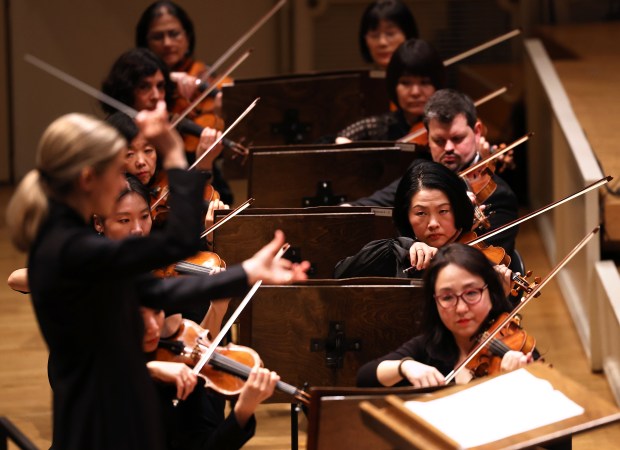Let’s hear it for substitute musicians.
Without subs, many a Chicago Symphony concert this year so far would have been impossible — including Thursday’s, with just one rostered musician each in the flute and trumpet sections. Considering the orchestra’s more than 20 open and soon-to-be-open seats into account, it’s no wonder the orchestra has been digging into its sub list as of late.
At one time, that list included Karina Canellakis, the conductor of Thursday’s concert. She was on the CSO’s sub roster in the mid-2000s as a freelance violinist, even touring with the orchestra. She returned to the CSO in 2022, this time as a conductor — she had been named the chief conductor of the Netherlands Radio Philharmonic, which just extended her contract through 2031, and the principal guest conductor of the London Philharmonic.
For her sophomore CSO stand, Canellakis paired the main event of Sergei Rachmaninov’s “Symphonic Dances” with two relative curios: Jean Sibelius’s “Oceanides,” which the orchestra has only performed once before in 1916, and Antonín Dvořák’s “The Wild Dove,” one of the composer’s oft-overlooked tone poems.
Canellakis’ extroverted, tensile podium style meshes well with the glintingly brilliant New York Philharmonic, where her appearances have been critically heralded. But in spite of the musical excellence of the orchestra’s guest and substitute musicians, Thursday’s CSO highlighted the challenges of becoming an orchestral revolving door, with Canellakis’ former ensemble often struggling to find a unified voice. One especially heard that strain in the trumpet section, where the vibrato-drenched delivery of guest principal Micah Wilkinson (Pittsburgh Symphony) clashed with that of colleagues Tage Larsen and Nuttapong Veerapun, and, at times, with Canellakis’ own whetted interpretations.
Despite a magnified, emphatic beat from Canellakis, “The Oceanides” sometimes sounded just as unfamiliar as it truly was for the Chicagoans. At one point the cellos were lost in the surging string layers; later, a trombone entrance came out more or less staggered. But the piece itself is appealingly scored and quintessentially Sibelius in style. On Thursday, Canellakis sold it well, building patiently so that its climax managed to feel at once inexorable and shocking — just like getting swept away by a mighty wave.
Dvořák’s “Wild Dove” likewise had highs and lows. The 20-minute work is vivid stuff, inspired by a Czech poem about a woman who tries and fails to get on with her life after murdering her husband. She is reminded of her sin by an incessantly cooing dove; Dvořak represents it with a spooky warbling in the woodwinds.
But Canellakis never fully embraced the storytelling inherent in Dvořak’s “Dove.” Her rendition took on the spirit of a meticulously painted pastoral, rather than the haunting psychological portrait it is. The most delicate strokes came from the woodwinds — the musical representation of the woman’s guilt — and French horns, whose dynamic control gave the tableau three-dimensional depth.
That section’s willingness to hush itself contrasted mightily with the inability of the trumpets and trombones to do the same. Here and in the Rachmaninov, CSO trumpet, trombone and tuba pianos sounded more discordant than delicate. More spirited moments fared no better, sounding crassly loud.
Nor did those “Symphonic Dances” start all that promisingly. Rachmaninov is an inspired but busy orchestrator, and the best interpretations make his dense writing sing. Instead, in the first movement, individual parts — piano, trumpets — sprung from the texture and jockeyed for attention. Even saxophonist Timothy McAllister, a frequent CSO guest, sounded uncharacteristically detached, his solo antsy and overseasoned with vibrato.
The Canellakis-CSO unit more than regained its footing in a standout second movement. The waltz’s ebb and flow was organic yet aching, the ensemble following her closely in stretched-out beats. Subtle but unified string portamentos (expressive slides between notes) sweetened the sound, making up for some of the tenderness lost in the first movement. Stephanie Jeong — holding down the concertmaster post most elegantly, as she has most of the season — played her violin solo with a plangent immediacy.
The finale wasn’t totally snag-free — some asynchronicity between woodwinds and horns here, still more boisterous brass there — but it was executed with a polish and inventiveness far closer to the second movement than the quarrelsome first. Here, individual exuberance allied into a coherent whole. Canellakis’ sense of pacing and arrival gave the Allegro vivace an exuberant profundity — impressive for a finale that’s easy to play for thrills. Just as impressively, a hitherto restless audience let the final tam-tam hit ring to dissipation. Only then did it uncork its applause.
Hannah Edgar is a freelance critic.
The Rubin Institute for Music Criticism helps fund our classical music coverage. The Chicago Tribune maintains editorial control over assignments and content.
“Canellakis Conducts Rachmaninov” repeats 1:30 p.m. Friday and 7:30 p.m. Saturday at Symphony Center, 220 S. Michigan Ave., tickets $45-$250, more information at cso.org
CSO’s 2025-26 season sees Mäkelä and Muti split duties — plus our short list of unmissables



